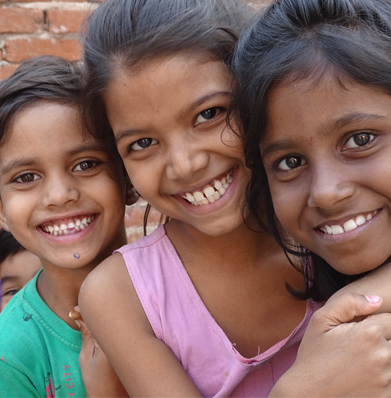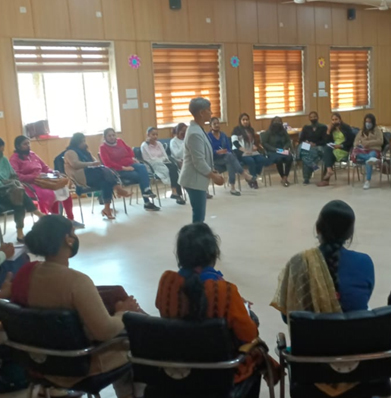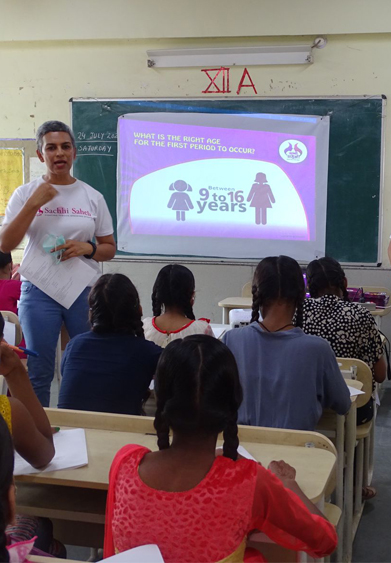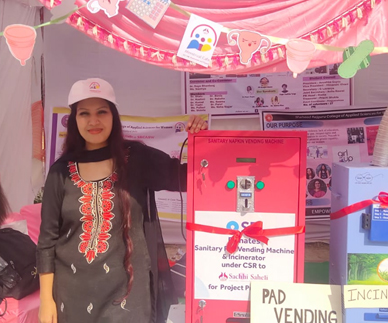Be the first one
-
+91 9999173839
-
42 A, Pocket C, SFS flats, Mayur Vihar 3, Delhi 96
Issue We Address
1. Menstrual Health & Hygiene Management
Due to the common view that Menstruation is dirty or impure, there exists a stigma around the natural process that devoid menstruators of a dignified experience, often times even opportunities and access to proper materials and facilities to manage their periods in a healthy manner. The stigma essentially exists due to lack of dialogue and consequent lack of proper knowledge about the process. Sachhi Saheli aims at bridging this gap through dissemination of proper and accurate knowledge among various beneficiary groups that includes students (of all genders), parents, teachers, health workers, social workers etc.
In an endeavor to contributing efforts for achieving Sustainable Development Goals:
- SDG 3: Ensure Healthy Lives and promote well-being for all.
- SDG 5: Achieve Gender Equality & Empower all women and girls.
- SDG 6: Ensure availability & sustainability of water and SANITATION by all.
- SDG 8: Promote sustained inclusive & sustainable economic growth, full and productive employment for all.


2. Sexual & Reproductive Health Rights of Women
Sexual and Reproductive health rights is a concept that is not known or isn’t a primary concern for many due to the existing taboo about sex and sexuality in India especially. The lack of access to affordable and non-judgmental healthcare and lack of knowledge about one’s body, reproductive and sexual processes leads womxn in India to be vulnerable and prone to several diseases and infections, unwanted pregnancies, unwanted abortions among others. As per a 2019 report by Family Planning Association, 14% pregnancies among women under the age of 20 were unplanned and 50% of maternal deaths among girls of 15-19 years of occurred due to unsafe abortions. Sachhi Saheli’s mission is to provide adequate knowledge to womxn about their sexual & reproductive health along with also sensitizing health care workers to provide non-judgmental and confidential healthcare to their patients.
In an endeavor to contributing efforts for achieving Sustainable Development Goals:
- SDG 3: Ensure Healthy Lives and promote well-being for all.
- SDG 5: Achieve Gender Equality & Empower all women and girls.
3. Comprehensive Sexuality Education
Despite several efforts from Educationists, Government Bodies, NGOs etc, Comprehensive Sexuality Education that is popularly known as Sex Education hasn’t found its way in school/college curriculums of India due to the prevalent cultural norms and the view that it may impact young people negatively. The evidence is contrary to that belief and suggests that Comprehensive Sexuality Education equips the young person to navigate important decisions about their sexual and reproductive health and provides them with the fundamental skills and values they need to develop a positive attitude towards gender equality. The existing lack of this knowledge leaves them looking for answers from unreliable sources where they receive incorrect, confusing and conflicting messages about their bodies, gender and sexuality.
With the mission to fill this gap, Sachhi Saheli is committed to educating and sensitizing parents, teachers and students on the importance of and the various components of Comprehensive Sexuality Education so that young people are able to take responsible decisions and are not vulnerable to Coercion, STDs, unintended pregnancies etc.
In an endeavor to contributing efforts for achieving Sustainable Development Goals:
- SDG 3: Ensure Healthy Lives and promote well-being for all.
- SDG 5: Achieve Gender Equality & Empower all women and girls.


4. Sexual Harassment
Sexual harassment is a common problem affecting both men and women irrespective of gender and the profession that they are in. though, In India, the sexual Harassment at Workplace Bill that was passed in 2013, the provisions were restricted to women and their modesty.
The Act ensures that women are protected against sexual harassment at all the work places, in accordance with SDG –5. But unfortunately, the bill overlooks the fact that sexual harassment in workplace applies to men also and “men are as vulnerable to sexual harassment as women.” And sometimes men become an offender due to their ignorance or typical patriarchal mindsets and upbringing.
Hence considering the awareness level of the people and psychological aspects of the problem, Sachhi Saheli sensitizes women and others on the rights and laws that are available to protect them against and how to use them. And we also aware and sensitize men what should be the behaviour at workplace so that they are not unknowingly penalised or punished for their ignorance .
Sachhi Saheli is also committed to bringing positive changes in attitudes and behaviours through programs and sessions that are gender neutral and advocate equal opportunities to all irrespective of their sex and sexuality.
- SDG 5: Achieve Gender Equality & Empower all women and girls.
5. Environmental Hygiene And Sanitation
Though substantial progress has been made in increasing access to clean drinking water and sanitation, billions of people worldwide —mostly in rural areas—still lack these basic amenities. 1 in 3 people do not have access to safe drinking water, 2 out of 5 do not have basic hand washing facilities and more that 673 million people still defecate in the open for lack of proper toilets.
Sustainable development goal 6 focuses on ensuring clean, safe and stable water supply, sanitation and hygiene for all by 2030 and to end open defaecation too. This will be achieved by protecting and restoring water related eco- systems, expand capacity building activities such as water harvesting, desalination, waste water treatment, recycling and reusing technologies to developing countries like India, also support and strengthen the participation of local communities in improving water and sanitation management.
- SDG 6: Ensure availability & sustainability of water and SANITATION by all.

The benefits of access to water, sanitation and hygiene cannot be underestimated since nearly all of the other SDG goals rely in some way on Water, sanitation and hygiene.
Sachhi Saheli through different programs and initiatives are working towards promoting hygiene and sanitation. The programs involve installation of portable, bio – toilets in urban slums for a healthy environment and to end open defecation among slum-dwellers. Sachhi Saheli has also taken up the mission of improving menstrual health and hygiene in communities by conducting awareness sessions on Eco-friendly Menstrual hygiene management, running social media campaigns, installing Sanitary pad vending machines and Incinerators to manage menstrual waste in an environmentally friendly method.
We also promote and encourage use of menstrual cups to reduce burden of menstrual waste on the environment. These programs have been very successful and Sachhi Saheli is making efforts to replicate them in more slums and communities.
Sachhi Saheli is a grassroots Indian non-profit organization which has been empowering women & children to become agents of change in society through activities like health, hygiene, sanitation & sensitization specified education.
Reach & Impact
Major Initiatives
ABOUT US
Sachhi Saheli is a grassroots Indian non-profit organization which has been empowering women & children to become agents of change in society through activities like health, hygiene, sanitation & sensitization specified education. Sachhi Saheli is an NGO with a mission to enable all the levels of our society to act collectively to ‘let’ every woman lead a life on her terms.



